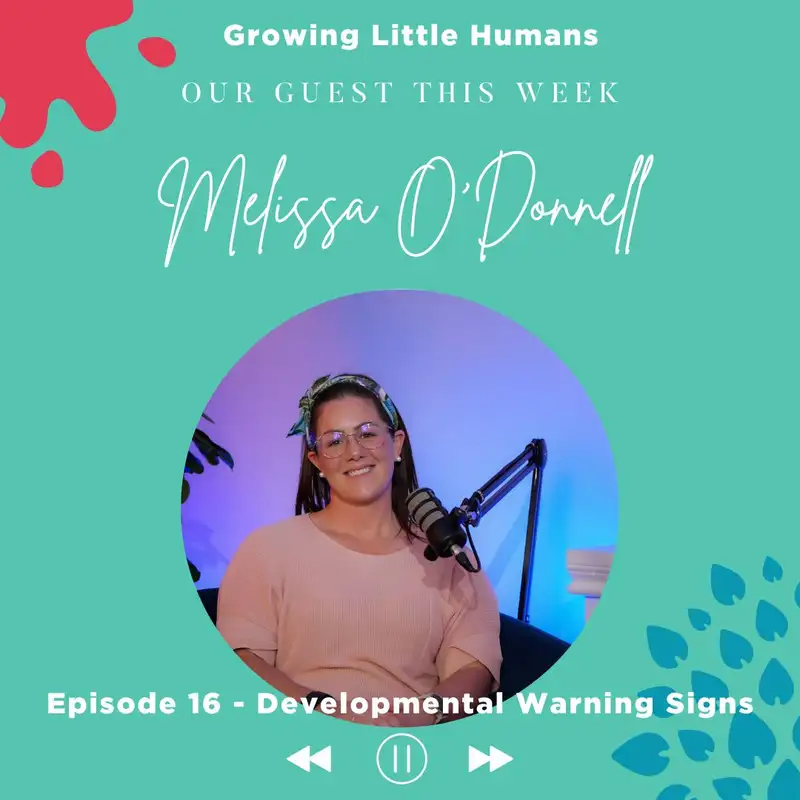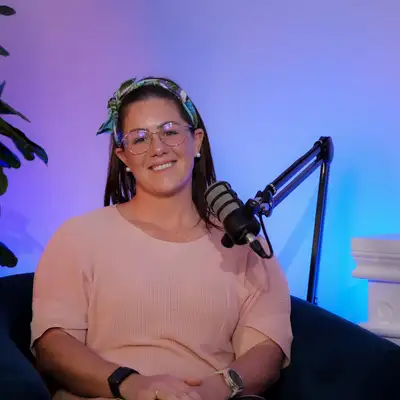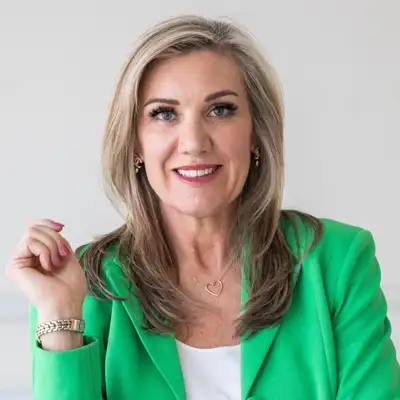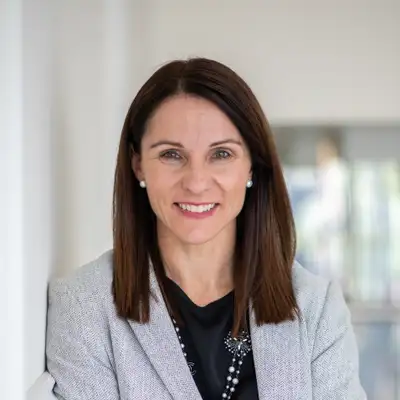
Spotting Developmental Warning Signs in Young Children
🎙 Transcript
ENGLISH AND ARABIC
Spotting Developmental Warning Signs in Young Children
Guest: Melissa O'Donnell
I'm Melissa and I'm Lea and we are busy mums, company founders and all round early learning nerds. Welcome to our podcast Growing Little Humans. Kids aren't born with a user manual so each week we'll try and cover many topics that you guys encounter and worry about each and every day while you're raising your little humans. Today we're thrilled to have with us Melissa O'Donnell, a highly experienced Behavior Analyst.
Melissa is the founder of Meaningful Measures, who provide applied behavior analysis services to a wide range of organizations, including healthcare, schools, and government agencies. With over 15 years of experience, Melissa's passion is to empower neurodiverse individuals and their families by offering compassionate, high-quality care that enhances quality of life and promotes inclusion. Hi Melissa, thanks for joining us today to talk about spotting developmental warning signs in young children.
Can we start off with having you explain to us, what neurodiversity is? Sure, great, thanks for having me, guys. So, neurodiversity is the concept that neurological differences are just natural variations in the brain. So things like autism, dyslexia, ADHD. So it's just natural variations in your brain rather than disorders that have to be fixed. And within this concept, we emphasize the unique strengths and perspectives of individuals with
neurological differences and celebrate them. Okay, amazing. And so a lot of the time in the space, we talk about developmental milestones. Can you explain what they are and why they are so important in early childhood? Yes, so developmental milestones and markers are certain abilities or skills, like talking, walking, or playing with your peers that typically develop at a certain age frame.
And it's important because professionals and parents are able to monitor progress and see when their children are growing and developing so that we're able to predict if there's any challenges or needs for support and intervene early. And of course, that's pretty variable in some ways, isn't it, Melissa, because, you know, obviously some children walk early, some children walk late, so there's a bit of variance in that as well. 100%.
And so what does that mean though, if they're not hitting them on time, or a range of on time. Yes, so there's not a huge cause for concern if you're not hitting a milestone on time. Like you were just saying, every child is individual, it varies, their pace is always going to be different. So when we would have some concerns or start to look at if we need extra support would be if there is multiple milestones that are missing.
across various domains or if there's significant, significant impairment within one of the milestones. And are there any specific kind of warning signs that a parent can be keeping an eye out for that might mean there's a developmental delay or? Yes. So I actually wrote some notes for this one because it does get into some of the technicalities of months. So let me go over some of the warning signs for different domains, like physical development. We're looking at in years 0 to 2.
We're looking at poor head control by four months and not sitting by nine months, as well as not walking by 18 months. Now this is going to change as you get older. So then we get into three- to five-year-olds when then we would say difficulty with coordination, such as running or climbing stairs. So this is the physical domain. Do you want me to keep going and getting into some of the other domains? We'll definitely share these in the show notes. Yes, perfect.
Great! So speech delay, I would say no babbling by nine months. So nine months old, this is what you're looking for, just some babbling. Or no single words by 18 months. Then when you're looking at older children, again, three to five, we would look at limited vocabulary or difficulty forming sentences. The next domain I would think about is social or emotional.
Now, you know, the terminology is not important, wherever domain you put it in, but these are just kind of what to look out for, to be aware of. Some guiding references. So if you notice something and you're like, hmm, this is the time to reach out to someone. So social and emotional, lack of smiling or interest in social interaction by six months, and difficulty making friends or expressing emotions appropriately once you get a little bit older. And then we have one final domain that we often talk about, which is cognitive.
So when you're looking at the younger ages, we look at difficulty following objects with their eyes by three months or not imitating sounds and actions by 12 months. As we get older, cognitive is trouble with basic problem solving skills or like sorting shapes or following simple one step directions. Okay. Well, that's quite
a lot of different things that we're looking for. Yes, and then again, this varies and every child is different. And this is why I wrote down the notes because these are specific standards that you look for in a benchmark. However, everyone is going to be different and if you don't meet one of those, that's fine. But like you said, concern is when there's multiple across multiple domains that there's an issue. So what would that look like, Melissa, you talked about to reach out to have some support, what would that look like? And also who should you reach out to, Melissa, as well?
So this is going to be different depending on your region, so you might have support on the ground within your region, but your first frontline worker would be a pediatrician. If you have a developmental or behavior pediatrician in your country or region, that would be fantastic. If you don't, a regular pediatrician or physician. And then once you reach out to them, you can also look for specialists like behavior analysts, which is what I do,
speech therapists, occupational therapists, and then don't forget the special education specialists, family and support development specialists. There's a lot of different people within that niche, but I would start off with your physician. Pediatrician. Yes, and so, when a parent does make that approach, what are the steps that are taken to evaluate that child and to see whether they are developmentally delayed?
Yes, so they typically do an interview at first, and then they do get into more of the diagnostic criteria where they would do more of the formal assessments. Once they do the formal assessments and can offer you a diagnosis, then you might look at referrals to different specialists who would have also more comprehensive reports based on speech, behavior, or motor skills. Right. And so as a part of that early intervention, obviously, is critical.
Why is it so critical for children with developmental delays? If you're concerned, should you reach out to someone straight away? Yes, so in the beginning, this is your critical growth period. When you're young, this is when you're learning and putting a lot of those brain synapses all together. So that's why early intervention is so important, because if you have early intervention, you are reducing the need in the future for long-term care. So, it's kind of like if you can get to it earlier, you might be able to support and put proper
intervention in place in order to reduce that need later on. And there'd be no need, because we're talking about a whole host of different developmental delays or conditions for want of a better word like autism or ADHD. So I'm imagining, Melissa, that there's no magic age that you would know by or that you would seek intervention at. How young though do you find that some of these
things can be picked up and are there any of these conditions that we're talking about that they won't diagnose at too young an age. Yes so I think the earliest I think the research now states it's around six months is the earliest that it can kind of be picked up. This is hard though, you know, you're not going to see that very often. It's usually a little later. But zero to two years, up to two years, you could see a lot of those warning signs that we had kind of spoke about.
You can pick it up that early and that is the time to get in there. However, some things won't be diagnosed until later, such as ADHD is kind of a tougher one. Sometimes it's in the later years, especially once you start going to school and noticing some more of these characteristics. But my suggestion would be to go in as soon as you feel like as a parent or a direct caretaker, as soon as you feel like something is off or you have a concern. Better to go in earlier and then to say, no need, don't worry, than to wait and go in later when you could have had support earlier.
Yes, I think that's a really good explanation of what early intervention is because I know it's one of those buzzwords, isn't it, that's out there. Yes. But not everybody knows exactly what that means, when's too early. And I think then, like you said, parents can make more of an informed decision and your child can get support. And also follow up, you know. So like you can go in at one year old and, you know, you have a conversation with your pediatrician and they say
nothing to cause concern right now. We're not going to do anything right now. However, if you go home and then six months down the line, you're like, ah, I don't know, go back, no problem. And also, you can get a second opinion too, Melissa. I think that's often really important to know that, you know, if you weren't perhaps happy or convinced with the first, you seek some advice elsewhere. A hundred percent. And especially with developmental disabilities, something like autism might not show signs until later.
And then one key characteristic of autism is that there's a regression. Right. So you might see them building skills and growing and developing up to two or three years old, and then all of a sudden notice a regression in speech. Um, so this, you know, this is another reason again, you might want to wait to get a diagnosis a little bit later, but you should be going in at the start and then following up and then you might get a diagnosis later.
And what role do schools and daycares and community programs, what involvement do they have in diagnosing and supporting families. Well, I mean, obviously, parents and caretakers are going to see your children the most often, you would think, but daycare, schools and nurseries are also seeing your children a lot. Sometimes more than maybe parents or caretakers would be. So they're very important in noticing these delays that might require extra support
and they're very important in being advocates for the children. And then when we do diagnose, we use a very comprehensive assessment where you're getting input from everybody. So, you're getting input from parents, you're getting input from teachers in the nurseries. And I would think too, Melissa, that the schools and daycares, because they have such a volume of children coming through, they would tend to see things in children maybe. And because you've got so many children together
when one isn't quite at the same level or is doing something different, it sticks out, stands out a little bit to the teacher. Exactly. They have many more peers to compare them to. So developmental skills, you could see the differences across the classroom. And I think as well a lot of the time with parents is that we always talk about, you know, parents might say, oh, well, they don't do that at home, but we have to be mindful of they may be doing that at school because it's such a different environment. So some things that
you may not be seeing in the home environment, maybe, you know, being shown in the over-simulating classroom and environment. In the school or nursery, you're being asked to do a lot more, whether it's doing math worksheets or whether it's walking to the bathroom. Where at home, it's usually a little bit less of a demand. So, yes, there are a lot of different variables at play in those different environments. And like you were saying, there's just those professionals who have so much more exposure to children and what happens in children's lives
then maybe a parent, this could be their first child and they could be a lawyer, which, you know, it's very different. So yes, they're very prominent people within the child's assessment process. And Melissa, are there any tools that parents can use at home to monitor their own child's development? So my favorite one is the CDC. The CDC has a website that has all the developmental milestones and markers, so that's an easy one to go to. And they also have an app.
So I think that's really handy and very cool. So I would suggest the CDC as your main resource, and then also your community. So this again is going to depend on what your community organizations are. I would say parent support groups are really important, advocacy groups, mental health, and the whole psychology in general, and especially in the Middle East, it's kind of booming right now. We're really creating more awareness and more space for it.
So being aware of what is available to you as a resource or support within that community, I think is like a great way to start. And that could be as silly as Facebook groups, you know? You wouldn't normally say, I'm not going to get my medical advice from the Facebook group. However, someone on there might have went through a similar journey or experience and says, hey, this developmental pediatrician is now in this area and they're really good at differentiating between the different diagnoses.
That's important and that's not everyone in the world is going to know that even if you're in the field, you're only going to know that from your local community. So I think that's really good advice to parents that are probably feeling really overwhelmed with concerns about developmental delays, but is there anything else that you would recommend to parents that are feeling that way, any final sort of advice that you would give to them? I would say just don't feel alone. You know that everybody is, there's a lot of people on the same journey as you. Join the different groups.
Reach out for help sooner than later. Don't be ashamed, don't worry. There's a lot of help out there for you. And just start the process earlier than later and you'll be very happy you did. I think that's really good advice for parents for sure, absolutely. Excellent advice. Thank you so much for joining us today, Melissa. It's been great to speak to you and we are going to include in the show notes all of the things that we've talked about today and also how parents can contact you directly as well, Melissa.
Fabulous, thanks so much for having me. And here come the Legals. Our podcast is purely brought to you for educational and entertainment purposes. We are just two hectic mums and we are certainly not licensed therapists. This podcast is not intended as a substitute for the advice of licensed or qualified professionals. And if you do need some help, please seek out some professional advice.
بالطبع! إليك الترجمة إلى العربية بنفس التنسيق الزمني:
---
**00:00**
أنا ميليسا
وأنا ليا
ونحن أمهات مشغولات، ومؤسسات لشركات، ومهووسات بالتعليم المبكر.
مرحبًا بكم في بودكاست "تربية البشر الصغار".
الأطفال لا يولدون مع دليل استخدام، لذا نحاول في كل حلقة تغطية العديد من المواضيع التي تواجهونها وتقلقون بشأنها يوميًا أثناء تربيتكم لأطفالكم الصغار.
اليوم يسعدنا أن نستضيف ميليسا أودونيل، وهي محللة سلوك خبيرة للغاية.
**00:27**
ميليسا هي مؤسسة شركة "ميينينغفول ميجرز"، التي تقدم خدمات تحليل السلوك التطبيقي لمجموعة واسعة من المؤسسات، بما في ذلك الرعاية الصحية والمدارس والهيئات الحكومية.
بخبرة تزيد عن 15 عامًا، شغف ميليسا هو تمكين الأفراد المتنوعين عصبيًا وعائلاتهم من خلال تقديم رعاية عالية الجودة ومتعاطفة تعزز جودة الحياة وتدعم الدمج.
مرحبًا ميليسا، شكرًا لانضمامك إلينا اليوم للحديث عن كيفية ملاحظة علامات التحذير النمائية لدى الأطفال الصغار.
**00:57**
هل يمكن أن نبدأ بشرحك لنا، ما هو التنوع العصبي؟
بالتأكيد، شكرًا لاستضافتي.
التنوع العصبي هو مفهوم يشير إلى أن الفروقات العصبية هي مجرد تنوعات طبيعية في الدماغ،
مثل التوحد، عسر القراءة، واضطراب فرط الحركة وتشتت الانتباه.
هي تنوعات طبيعية وليست اضطرابات يجب إصلاحها.
ومن خلال هذا المفهوم، نركز على القوى والمنظورات الفريدة لهؤلاء الأفراد ونحتفي بها.
**01:26**
رائع. غالبًا ما نتحدث في هذا المجال عن مراحل النمو.
هل يمكنك أن تشرحي ما هي ولماذا تعتبر مهمة في الطفولة المبكرة؟
نعم، مراحل أو معالم النمو هي قدرات أو مهارات معينة، مثل التحدث أو المشي أو اللعب مع الأقران،
تتطور عادة في إطار زمني معين.
**01:53**
وهي مهمة لأن المحترفين والآباء يستطيعون مراقبة التقدم ورؤية نمو وتطور أطفالهم،
وبالتالي توقع أي تحديات أو احتياج للدعم، والتدخل مبكرًا.
وطبعًا هذا يختلف من طفل لآخر، أليس كذلك ميليسا؟ فبعض الأطفال يمشون مبكرًا والبعض الآخر يتأخر قليلًا.
تمامًا، 100%.
**02:20**
فماذا يعني ذلك إذا لم يحقق الطفل تلك المراحل في الوقت المحدد؟
ليس هناك سبب كبير للقلق إذا لم تتحقق مرحلة نمو في الوقت المحدد. كما قلتِ، كل طفل فريد، وتيرتهم تختلف دائمًا.
نبدأ بالقلق أو التفكير في الدعم الإضافي إذا كانت هناك مراحل متعددة مفقودة في مجالات مختلفة،
أو إذا كان هناك ضعف كبير في إحدى المهارات.
**02:47**
هل هناك علامات تحذيرية محددة يجب على الأهل الانتباه لها والتي قد تشير إلى تأخر نمائي؟
نعم. في الواقع، كتبت بعض الملاحظات لأن هناك تفاصيل تقنية مرتبطة بالشهور.
فيما يخص النمو الجسدي في الأعوام من 0 إلى 2، نلاحظ ضعف السيطرة على الرأس بحلول 4 أشهر،
عدم الجلوس بعمر 9 أشهر، وعدم المشي بعمر 18 شهرًا.
ثم عند الأطفال من 3 إلى 5 سنوات، نلاحظ صعوبة في التنسيق، مثل الجري أو صعود الدرج.
**03:39**
هل تريدين أن أواصل الحديث عن المجالات الأخرى؟
بالطبع، سنشارك هذه النقاط في الملاحظات المرفقة.
رائع!
فيما يتعلق بتأخر الكلام، عدم التمتمة بعمر 9 أشهر، أو عدم وجود كلمات مفردة بعمر 18 شهرًا.
ثم في سن 3 إلى 5 سنوات، نلاحظ مفردات محدودة أو صعوبة في تكوين جمل.
**04:00**
المجال التالي هو الاجتماعي أو العاطفي.
قد تختلف التسميات، ولكن الهدف أن نكون على وعي بهذه العلامات.
مثل عدم الابتسام أو عدم الاهتمام بالتفاعل الاجتماعي عند عمر 6 أشهر،
وصعوبة في تكوين صداقات أو التعبير عن المشاعر بشكل مناسب لاحقًا.
**04:29**
أما المجال الأخير فهو المعرفي.
عند الأعمار الصغيرة، نلاحظ صعوبة في تتبع الأشياء بالنظر بعمر 3 أشهر،
أو عدم تقليد الأصوات أو الحركات بعمر 12 شهرًا.
وفي الأعمار الأكبر، نلاحظ صعوبة في حل المشكلات الأساسية أو ترتيب الأشكال أو اتباع تعليمات بسيطة.
**04:50**
هذه مؤشرات كثيرة يجب مراقبتها.
صحيح، ولهذا السبب كتبت الملاحظات لأنها معايير قياسية، ولكن كما قلتِ، كل طفل مختلف.
والقلق يكون عندما تكون هناك عدة مؤشرات عبر مجالات مختلفة.
**05:19**
ماذا يجب أن نفعل إذا لاحظنا هذه العلامات؟ من نلجأ إليه؟
هذا يعتمد على منطقتك.
لكن البداية دائمًا تكون مع طبيب الأطفال.
وإذا توفر لديك طبيب أطفال متخصص في النمو أو السلوك، فذلك ممتاز.
وإلا فيمكنك البدء بطبيب أطفال عادي.
ثم يمكن الإحالة إلى مختصين مثل محللي السلوك (مثلي)،
أو أخصائيي النطق، العلاج الوظيفي، أو التربية الخاصة.
**06:08**
عندما يقرر الأهل المتابعة، ما الخطوات المتخذة لتقييم الطفل؟
عادة يبدأ الأمر بمقابلة، ثم يخضع الطفل لتقييمات رسمية تشخيصية.
بعد التشخيص، يتم الإحالة لاختصاصيين لإجراء تقارير أكثر شمولًا حول الكلام أو السلوك أو المهارات الحركية.
**06:37**
ولماذا يعتبر التدخل المبكر مهمًا جدًا؟
السن الصغيرة هي فترة النمو الحرجة. الدماغ يتطور بسرعة، والروابط العصبية تتكون.
لذلك، التدخل المبكر يمكن أن يقلل الحاجة لدعم طويل الأمد في المستقبل.
بمعنى أن الدعم المبكر قد يقلل أو يمنع التحديات المستقبلية.
**07:06**
نحن نتحدث عن طيف واسع من التحديات النمائية مثل التوحد أو ADHD.
هل هناك سن معينة يجب التدخل عندها؟
تشير الأبحاث الآن إلى أنه يمكن رصد بعض العلامات بعمر 6 أشهر، رغم أنه نادر الحدوث.
ولكن من سن 0 إلى سنتين، يمكن ملاحظة الكثير من علامات التحذير.
ومع ذلك، بعض الحالات مثل ADHD يتم تشخيصها لاحقًا، غالبًا عند دخول المدرسة.
**08:03**
نصيحتي هي أن تتابع بمجرد أن تشعر كأب أو مقدم رعاية أن هناك أمرًا غير طبيعي.
من الأفضل أن تتصرف مبكرًا حتى لو تبين لاحقًا أن الأمر لا يستدعي القلق.
**08:32**
هذا توضيح رائع لمفهوم التدخل المبكر، لأنه مصطلح متداول ولكن ليس واضحًا دائمًا.
صحيح. وعندها يمكن للأهل اتخاذ قرارات مدروسة.
**08:55**
ويمكن المتابعة، مثلًا تذهب في عمر سنة للطبيب ويقول لا توجد مخاوف حاليًا.
لكن بعد 6 أشهر، إذا لاحظتِ شيئًا جديدًا، يمكنك العودة. لا مشكلة.
ويمكنك دائمًا أخذ رأي ثانٍ أيضًا، وهذا مهم جدًا.
خاصةً في حالات مثل التوحد التي قد لا تظهر علاماتها إلا لاحقًا، أو قد يحدث تراجع بعد نمو طبيعي.
**09:23**
من الأعراض المعروفة في التوحد وجود تراجع، كأن يتعلم الطفل الكلام ثم يفقده فجأة بعمر سنتين أو ثلاث.
وهذا سبب آخر يدفعك للمراجعة، والمتابعة لاحقًا للحصول على تشخيص أدق.
**09:47**
ما دور المدارس ودور الحضانة والبرامج المجتمعية في الملاحظة والتشخيص والدعم؟
الآباء يرون أطفالهم كثيرًا، لكن المدارس ودور الحضانة أيضًا يقضون معهم وقتًا كبيرًا،
وأحيانًا أكثر من الآباء. لذا دورهم مهم جدًا في ملاحظة أي تأخر.
**10:15**
وعند التشخيص، نستخدم تقييمًا شاملًا يتضمن آراء الجميع: الآباء والمعلمين في الروضة.
كما أن المعلمين يلاحظون الفروقات بسهولة لأن لديهم العديد من الأطفال للمقارنة.
**10:45**
وفي المنزل قد لا تلاحظ الأم شيئًا، ولكن في المدرسة قد يظهر الأمر في بيئة محفزة ومليئة بالأنشطة.
**11:14**
في المدرسة، يُطلب من الطفل الكثير مقارنة بالمنزل، مثل أداء المهام أو التنقل.
وهذا يبرز بعض التحديات.
المعلمون لديهم خبرة أكبر مع الأطفال، بينما الأهل قد يكون هذا طفلهم الأول.
**11:43**
هل توجد أدوات يمكن أن يستخدمها الأهل لمتابعة نمو أطفالهم في المنزل؟
المفضل لدي هو موقع CDC، لديهم كل المعالم النمائية بشكل واضح وسهل.
ولديهم أيضًا تطبيق، مما يجعله أكثر سهولة.
**12:13**
كما أنني أوصي بمجتمعك المحلي.
حسب موارد مجتمعك، يمكنك الانضمام لمجموعات دعم الآباء، أو مجموعات توعوية أو نفسية.
وفي الشرق الأوسط، هناك تطور كبير في هذا المجال حاليًا.
**12:43**
حتى المجموعات على فيسبوك قد تساعد، فمثلًا أحد الأعضاء قد يوصي بطبيب جيد.
المعرفة المجتمعية المحلية مهمة جدًا لأنك لن تجد هذه المعلومات في الكتب دائمًا.
**13:08**
نصيحتي الأخيرة للأهل القلقين من تأخر نمو أطفالهم؟
لا تشعروا بالوحدة. كثيرون يمرون بنفس التجربة.
انضموا للمجموعات واطلبوا المساعدة مبكرًا. لا تخجلوا، ولا تقلقوا، فالدعم موجود.
كلما بدأت مبكرًا، كنت ممتنًا لاحقًا.
**14:05**
نصيحة ممتازة فعلًا. شكرًا جزيلًا لكِ ميليسا على انضمامك إلينا.
سعدنا بالحديث معك، وسنضيف في الملاحظات كل ما تحدثنا عنه اليوم،
بما في ذلك كيفية تواصل الأهل معكِ مباشرة.
**14:30**
شكرًا جزيلًا لاستضافتي.
والآن إلى الأمور القانونية!
هذا البودكاست مخصص لأغراض تعليمية وترفيهية فقط.
نحن فقط أمهات مشغولات ولسنا معالجات مرخصات.
ولا يُقصد بهذا البودكاست أن يكون بديلًا عن نصيحة المختصين المؤهلين.
إذا كنت بحاجة إلى مساعدة، يرجى التوجه إلى مختصين محترفين.
Creators and Guests


